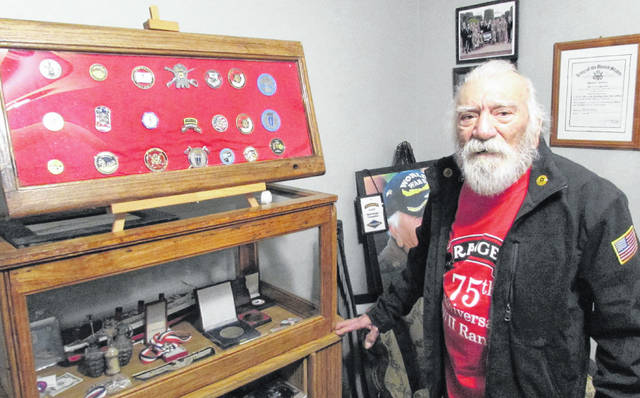
World War II veteran and new Hillsboro resident Rudolph “Roy” Huereque celebrated his 95th birthday Friday, April 16, and though he can easily recall facing off against Hitler’s and Mussolini’s troops in Europe, his fondest memories these days were being able to be a part of the observance of the 75th anniversary of D-Day in June 2019.
“I was sitting right behind President Trump when he was speaking,” Huereque remembered, “and when he got through speaking, he turned around and started shaking everyone’s hand, so I stuck my hand right out and shook hands with the president.”
In a treasured photograph from the event, Huereque can be seen standing next to the 45th president, and he took advantage of the occasion to shake hands with first lady Melania Trump as well.
“We were waiting for the photographers and I was looking at her, and I asked her if I could shake her hand, and she shook hands with me, and I didn’t wash that hand for over a month,” he joked.
Huereque’s story began when he was born in New Mexico on April 16, 1926. He grew up in Los Angeles, and then at the age of 18 the future private first class was drafted in August 1944 and sent to basic training at Camp Roberts, California. From there he was sent to England as an infantry replacement.
Upon his arrival, he said he was approached by some other soldiers who were looking for volunteers for the Rangers, and he did what every soldier is told to never do — volunteer.
Suddenly a member of Company D, 5th Ranger Battalion, Huereque fought the Nazi’s with his fellow Rangers through Belgium, Luxembourg, Germany and Austria.
He said he was a part of the Allied invasion of Europe at Normandy, and though he wasn’t involved in the carnage of June 6, 1944, he and his fellow Rangers went in as replacements the following day, conducting “mop-up” operations in the days and weeks that followed.
“We Rangers were a small battalion of about 500 men,” he said. “We did special services and mop-up missions, and were attached to different outfits, including Patton’s Third Army. I can remember being out in the field and the sky would be lit up at night with the exchange of Allied and German artillery fire.”
He said that when Patton would “spearhead” or lead an attack, he and his fellow Rangers would ride on the back of the tanks so they could go in and mop up after the attack, and root out any German troops or citizens sympathetic to the Nazis in the town or village just assaulted.
“Patton always said ‘we don’t retreat,’ and that scared the life out of me!” Huereque laughed.
The steeples of churches were a favorite place for German observers to follow and radio back American troop movements, and Huereque said the tankers developed a pastime of betting other tankers who could hit them with their first shot.
“They’d bet each other with things they got from home or picked up along the way,” he said. “One would bet a box of homemade cookies and another had a bottle of Schnapps he picked up someplace, and then they’d lob a phosphorous shell into one of those steeples.”
He remembered a darker side of his war experiences, having witnessed the atrocities of the infamous Nazi concentration camps firsthand when they liberated some of the villages.
“We went through with the spearhead of Patton’s tanks, and after we were through shooting up the whole place, they would order a cease fire and we’d go in and do mop up,” Huereque said. “And you couldn’t believe what they did to those poor people — they were walking skeletons with bloated stomachs, and some of them would grab hold of your legs and wouldn’t let go because they knew we were there to liberate them, begging us not to leave them behind.”
He said those were the worst memories he has carried with him over the years, with his wife adding that to this day, he still has nightmares of what he saw.
When news of the German surrender reached his company, his outfit was close to the Russian Army near Vienna, Austria.
After Germany’s unconditional surrender and months of occupation duty, he boarded a Liberty ship for home and mustered out of military service at the age of 20.
“When I got home, I couldn’t buy a job,” he said. “I went everywhere trying to find some work, and I found out Jimmy Hoffa was hiring, so I went to the union hall since there were trucking companies looking for drivers.”
He worked as a trucker for 26 years, taking time out to marry the love of his life, Barbara, with whom he celebrated his 61st wedding anniversary last year, and to be a father of three daughters and a son.
Today, he has traded in the sand and scorpions of the desert southwest of his childhood for the green grass, deer and squirrels that frequent their new home in Hillsboro, surrounded by the memories and mementos of one whom Tom Brokaw called in his 1998 book “The Greatest Generation.”
Reach Tim Colliver at 937-402-2571.


